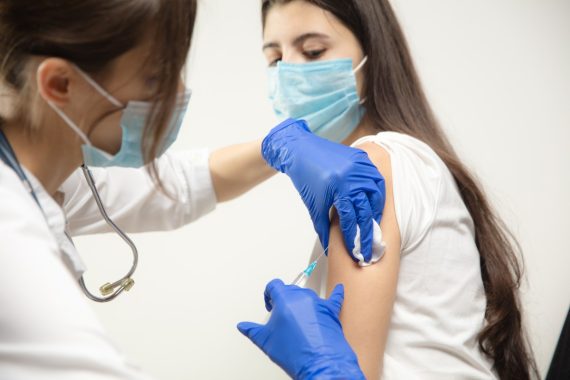The uptake of adolescent vaccines has fallen in the last year, leaving many young people unprotected from life threatening diseases, the UK Health Security Agency has warned.
New data published by the UKHSA showed that the uptake of the Td/IPV and MenACWY vaccines for children in school year 9 was 69%, around 7% lower than the previous year and well below pre-pandemic levels (87.6% for Td/IPV and 88% for MenACWY in the 2018 to 2019 academic year).
The UKHSA said that the routine adolescent immunisation programmes have been impacted by the pandemic and coverage is not back up to pre-pandemic levels, but that the NHS has already caught up many children who missed out on their vaccines, with uptake improving to around 80% for children in year 10.
Now the UKHSA is urging parents and guardians to ensure eligible young people are up to date with their adolescent vaccines before they leave school.
Dr Vanessa Saliba, consultant epidemiologist at UKHSA, said: ‘Vaccines protecting against tetanus, diphtheria, polio and meningococcal disease are offered to young people in school year 9 and are being delivered in schools right now.
‘In recent years we have seen vaccine uptake fall due to the challenges posed by the pandemic.
‘Many young people who missed out on their vaccinations have already been caught up, but more needs to be done to ensure all those eligible are vaccinated.
‘Children and young people who have missed out on their teenage vaccines should contact their school nurse, school immunisation team or GP surgery to arrange a catch-up.
‘These vaccines offer the best protection as young people start their journey into adulthood and mixing more widely – whether going to college, starting work, travelling or going to summer festivals.’
Health minister Maria Caulfield said: ‘It’s incredibly important for children to stay up to date with routine vaccinations as this remains one of our best defences against infectious diseases, not just for the person being vaccinated but for their family, friends and those around them.
‘If your child is due for a vaccination, you don’t need to wait to be contacted – speak to your school nurse, school immunisation team or GP surgery to book an appointment.’
Steve Russell, NHS England’s national director for vaccination and screening, said: ‘The 3-in-1 teenage booster and the MenACWY vaccination are extremely well-researched and proven to provide protection against a range of diseases that can cause serious illness.
‘NHS School Aged Immunisation Services offer these vaccinations in secondary schools, as well as the HPV vaccination that protects against a range of cancers and we strongly urge those eligible and their family members and guardians to ensure they are up to date, and if not to come forward for their vaccines as soon as possible – it’s the best way to keep you protected.’
Last week, UKHSA’s director of public health programmes Dr Mary Ramsay told a group of MPs that workload around vaccine delivery ‘fell purely onto general practice’ in the past decade due to the fragmentation of the NHS.
Pulse October survey
Take our July 2025 survey to potentially win £1.000 worth of tokens














Another harm from Lockdown.
Meanwhile elsewhere in the news:
Masks useless –
“Requirements to wear surgical masks in a large London hospital during the first 10 months of Omicron activity (December 2021 to September 2022) made no discernible difference to reducing hospital-acquired SARS-CoV-2 infections, according to new research being presented at this year’s European Congress of Clinical Microbiology & Infectious Diseases (ECCMID) in Copenhagen, Denmark (15-18 April).”
Lockdowns Useless –
Levitt, M., Zonta, F. & Ioannidis, J.P.A. Excess death estimates from multiverse analysis in 2009–2021. Eur J Epidemiol (2023).